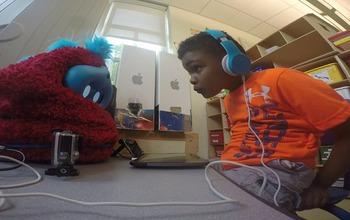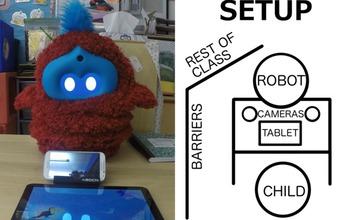
Since more and more parents these days are looking for personalized, one-on-one attention for their children, artificial intelligence researchers have come up with a solution: robot tutors.
Goren Gordon, an artificial intelligence researcher from Tel Aviv University who runs its Curiosity Lab, worked with a Personal Robots Group at MIT, led by Cynthia Breazeal, to develop a socially assistive robot named Tega, that serves as a one-on-one peer learner in or outside of the classroom.

No, these education robots aren’t new, but what Gordon and the team did was design the robots to interpret emotional responses of the student it is working with and then create a personalized motivational strategy.
The robot system was tested within a pre-school classroom where the researchers showed that it could learn and improve itself in response to the characteristics of the students it worked with. According to the team, it was actually more effective at increasing students’ positive attitude towards the robot and activity than a non-personalized robot assistant.
The initial Tega robot worked with 38 students ages three to five in a Boston-area school last year. Each student worked individually with Tega for 15 minutes per session over the course of eight weeks.
Tega is a bright-colored and fluffy looking robot developed specifically to enable long-term interactions with children. It uses an Android device to process movement, perception and thinking and can respond to children’s behaviors by interpreting the emotional content of facial expressions, a method known as “affective computing.”

Personal Robots Group, MIT Media Lab)
In addition to tracking long-term impacts of the personalization, they also studied immediate changes that a response from Tega elicited from the student. From these before-and-after responses, they learned that some reactions, like a yawn or a sad face, had the effect of lowering the engagement or happiness of the student — something they had suspected but that had never been studied.
“What is so fascinating is that children appear to interact with Tega as a peer-like companion in a way that opens up new opportunities to develop next-generation learning technologies that not only address the cognitive aspects of learning, like learning vocabulary, but the social and affective aspects of learning as well,” said Cynthia Breazeal, associate professor of Media Arts and director of the Personal Robots Group at the MIT Media Laboratory.
The researchers plan to improve upon Tega and then test the robot in different settings, including with students with learning disabilities, for whom one-on-one interaction and assistance is important.
So, would you let Tega interact with your kids? Let us know!
Story via National Science Foundation.

Comments are closed, but trackbacks and pingbacks are open.